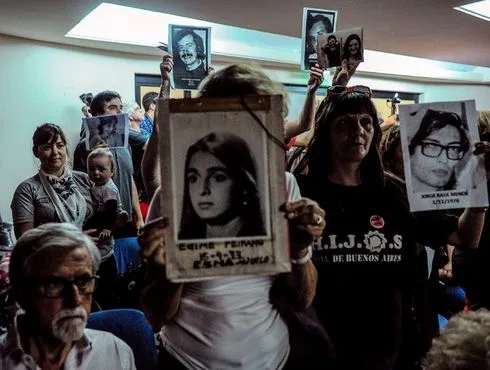Judges sentence 29 for throwing civilians to their deaths from aircraft during Argentina dictatorship
Judges overseeing Argentina’s most high-profile human rights trial sentenced 29 former officials to life in prison on Wednesday, in a case that documented the former military dictatorship’s widespread practice of killing civilians by throwing them from aircraft.

Relatives of people who disappeared during the Argentine military dictatorship appeared at the sentencing in Buenos Aires.
“This is a happy moment in the long fight for justice that has been going on for decades,” said Victor Basterra, 73, a former political prisoner held at the notorious naval base in Buenos Aires that was at the heart of the case. “It’s always satisfying to watch them get life sentences.”
The verdict capped the most ambitious effort to date to hold former military leaders accountable for abuses committed during the 1970s and 1980s, when several Latin American countries were ruled by right-wing military juntas. Prosecutors tried 54 former Argentine officials in the deaths or forced disappearances of 789 people, and presented testimony from more than 800 witnesses.
The court acquitted six defendants, including a couple of pilots, and sentenced the rest to prison terms that ranged from eight to 25 years. As the four-hour sentencing hearing concluded, the defendants avoided looking at former political prisoners and relatives of those who were killed, who were standing in the back of the courtroom.
Some in the gallery held photographs of their loved ones. “Murderers, rapists,” victims yelled, tapping on a glass panel that separated them from the defendants. “You’re going to jail!” an older woman exclaimed triumphantly.
The five-year trial put a spotlight on the systematic torture and killing of thousands of people suspected of being opponents of the military government. They were held in a clandestine detention center at a naval base in Buenos Aires on the orders of the junta that ruled Argentina from 1976 to 1983.
In a series of hearings, witnesses recounted in chilling detail how civilians were drugged, loaded onto aircraft and dumped into the waters off the coast of Buenos Aires. While the practice has long been known, prosecutors managed to cross-reference testimony and documents to detail how one of the most egregious tactics of Argentina’s dictatorship was carried out.
The trial also shone light on the complicity of the Roman Catholic Church in the junta’s crimes. No member of the clergy was accused in the trial, but prosecutors alleged that church officials were complicit in hiding detainees from international human rights inspectors.
“We are very satisfied with the verdict,” said Abel Córdoba, a prosecutor. “We think this is a fair decision that proved the methodology of death flights as a way of extermination.”
Of all the secret detention centers in Argentina at the time, the most infamous was at the Higher School of Mechanics of the Navy, known as the ESMA, its acronym in Spanish. According to testimony, an estimated 5,000 people were detained and tortured at the base, which is now a human rights memorial.
High-profile defendants in the case included former naval officers Alfredo Astiz, Ricardo Cavallo and Jorge Acosta, who were already serving sentences for previous convictions.
The verdict comes as Argentine human rights organizations are questioning President Mauricio Macri’s commitment to the legal reckoning of the human rights abuses committed during the dictatorship, an effort that was championed by his predecessor, Cristina Fernández de Kirchner.
Mr. Macri has taken pains to emphasize his support for the cases. Yet activists say his administration has sent mixed signals by dismantling human rights departments in ministries; by questioning whether the often-cited estimate of victims from that era has been overstated; and by emphasizing the need for Argentina to turn the page on that dark chapter of its history.
Mr. Córdoba said he was hopeful the country’s shifting politics would not stymie the pursuit of justice in scores of pending human rights cases. “We think it’s important for the courts to continue sending a message regarding crimes against humanity,” he said Wednesday night.
Argentina has done more than any of its neighbors to punish people for crimes committed during the era of military rule. As of last month, 818 people had been convicted and 754 defendants were on trial in Argentine court cases, according to the attorney general’s office.
Argentina’s junta has long been regarded as the most ruthless of the era, having detained, tortured and killed as many as 30,000 people it deemed “subversive.” In addition to killing people suspected of being dissidents, military officials kidnapped hundreds of babies who were then reared by families loyal to the government.
___________________
Credit: The New York Times, www.nytimes.com





















